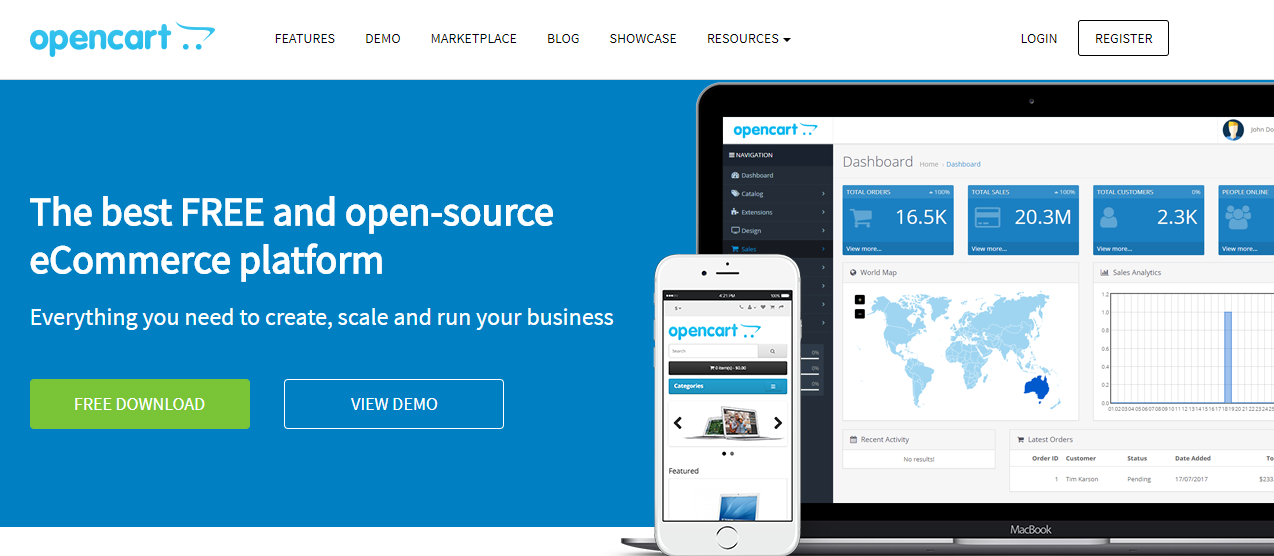Which is the Top-Rated Platform for Buying Real Google Reviews?
Barsha Bhattacharya, 6 days ago

Barsha Bhattacharya, 2 weeks ago

Barsha Bhattacharya, 2 weeks ago


Running a successful eCommerce store is pretty exciting – at least that’s what I’ve been thinking for some time now. With an eCommerce store, I can design my brand, build my website, and share my beautiful products with everyone around.
But before I can create my to-do list and plan an eCommerce business, I’ve been thinking about where my business could be heading in the next three years. What tools will I need in three years?
So, I set out to compare the best eCommerce platforms of the year – the ones that will help me start a business. If you have been facing this dilemma, then this article is for you.
Stay tuned!
eCommerce platforms contain software for developing and running a digital store and doing other retail activities such as inventory management, payment processing, and marketing.
Moreover, I realized that the best eCommerce platforms allow merchants to create their authentic websites and run their stores without any issues. After much research, discussions with experts online, and a few common (but vital) factors, I picked out the eight best eCommerce platforms of the year. And I’m here to share my findings with you!
So, here’s a comprehensive overview of the best eCommerce platforms of 2025:

Shopify is an e-commerce solution that is based in Canada. This site has been of great assistance to online businesses all over the world with a close focus on the trending mobile shopping and social commerce sites.
Shopify was founded in 2004 and has kept up to date with the speed at which technologies and e-commerce trends have been evolving.
It has broken its ground with its powerful additions that don’t allow your customers to leave the platform for them to buy from you. There are several features that make Shopify one of the best eCommerce platforms.
Some of its advantages include recovery of an abandoned cart, a plethora of extensions, plugins, and themes, integration of Shopify directly into our Facebook account at only $9, mobile-friendly seller mobile apps, and shopping cart among other available mobile-based features.
Shopify has 24/7 live chat technical support, together with tutorials and a phone number. Shopify also has a very powerful community forum.
The main undoing of Shopify is the addition of transaction fees if you don’t make use of their payment system. Other practical and useful extensions also require the user to make an additional investment.

Magento is one of the sites you need to think about when looking for the best e-commerce website. The platform was launched in March 2008 as an open-source e-commerce platform.
Some of the factors that make Magento stand out in the market include its scalability and reliability. Some of the prominent brands that have built their names on Magento include Liverpool F.C., Pepe Jeans, Huawei, and Burger King, just to name a few.
The pros of Magento include unlimited open-source options for customization, manageability, and usability, over 9000 extensions and plugins to create some room for scalability, exclusively free extensions on social media, extensive library resources for store management, new plugins, demos, and all things that revolve around e-commerce stores.
However, you cannot use Magento unless you have some programming knowledge. The basic version is a free eCommerce platform, but you have to pay close to $20,000 for the premium version on an annual basis. This platform is the right choice for enterprise-level online stores.
On the other hand, as technology continues to evolve, the Magento eCommerce platform has also improved to provide its users with a better user experience and additional amazing features. The latest version, commonly known as Magento 2, offers new capabilities to fill the gaps in the older version. In fact, Magento 2 uses cutting-edge innovations to enhance performance, security, and functionality.

This e-commerce platform is specially designed for SMBs and startups. It is the ideal option for building multi-vendor stores like Etsy, eBay, and Amazon.
Even though other sites list the multi-vendor version as an option, YoKart exclusively specializes in this, especially its latest upgrade of the V8 version. It has multi-currency and multilingual features that will enable you to expand your reach to a global level.
It also comes with a plethora of payment gateways, discount and reward features for coupon management, and built-in analytics tools. This mobile-friendly multi-vendor market solution is ready-made and has dedicated apps for both Apple and Android devices.
While YoKart has a robust multi-vendor platform, it also has several drawbacks, including limited themes, a need for personalization, and space for high expenses related to support and specific integrations. Moreover, vendors also exercise limited control and autonomy over the tax settings.

BigCommerce boasts of over 55,000 online stores since its inception making it one of the most popular e-commerce sites. The site has been helping both small and big brands such as Toyota, and Marth Stewart among other SMEs to launch their storefronts.
BigCommerce has inbuilt features that are very helpful to eCommerce store owners who don’t have basic coding skills. Some of its built-in features include analytics, tax, shipping, coupons, and newsletters.
The platform has highly responsive themes, no transaction fee, is easy to integrate with eBay, Facebook, and Google shopping, tutorial videos, an Easy setup wizard, and detailed guides that come with the required demos and illustrations.
So, while the standard pricing for BigCommerce offers multiple features for building an entirely functional store, any further website development might cost you a lot especially if you want custom solutions and premium functionalities.

This platform is a free eCommerce platform or WordPress Plugin that is very popular in the e-commerce world. However, you must put in some investment if you want to integrate the shopping cart fully into this system.
It’s an easy-to-use and open-source solution for WordPress Aficionados and comes with a secure shopping cart and payment gateway. These two features work so well, even though you require an additional plugin to set up a multi-vendor e-commerce store.
The advantages of WooCommerce include an excellent shopping cart, a secure payment gateway, a broad range of extensions and plugins, unlimited product categories, and an admin panel that is easy to manage. Some of the Challenges of WooCommerce are the lack of scalability.
WooCommerse continues to face multiple security challenges. Moreover, it is a popular target for fraud and security attacks. Also, as a popular eCommerce platform, WooCommerce and WordPress is targeted frequently by cyberattacks. This is because hackers typically find multiple vulnerabilities in the platform in terms of themes or plugins.

This tool was launched in 1998 as a Perl-based eCommerce tool before its domain expired in 2005. A UK developer under the name Daniel Kerr decided to take over the project and used it to lay the foundation of his PHP-written e-commerce solution.
The developer is currently using a tight team that works out of Hong Kong to run this project, which boasts an ever-increasing community of developers.
It’s well-known for its intuitive user interface and easy setup. Currently, OpenCart is powering close to 342,000 online stores. It’s one of the high-performing free eCommerce websites.
Some of its advantages include a fast and lightweight, simple user interface, and free, and loads of extensions. However, it’s not SEO-friendly and a bit hard to customize.
You will need a certain level of skills and expertise to use OpenCart to its complete potential. Also, the platform’s loading speed is very slow. As a result, this can negatively impact your store’s overall customer experience.

Zen cart is an absolutely free open-source online shopping cart solution for the web-savvy. This is a fully customized software that is based on MySQL/PHP and you can download it at no cost.
The ancestry of the Zen Cart can be traced back to the famous osCommerce because it actually used to be part of osCommerce.
The source code of Zen Cart is fully customizable, and this allows all users to modify, tailor, and develop the site depending on the unique needs of the business.
There are huge numbers of web developers, programmers, designers, and business owners who have volunteered to develop and maintain Zen Cart. It can seamlessly integrate with the most popular gateways and has video-based training to help you start off. It is one of the best eCommerce platforms available for your use.
Zen Cart might be an excellent platform but it does have certain limitations including a steep learning curve for any non-technical user, limitations in terms of themes and templates, few third-party integrations, and a small market share.

PrestaShop is the best option if you are looking for a free eCommerce platform. The website began in 2005 as a student project. Currently, more than 250,000 online stores are using it, and it commands a market ratio of 0.5 percent.
PrestaShop has two free options including one that is fully-hosted in the cloud but you can also self-host and this gives you full technical control of your e-commerce store. It is easy to configure and install, available in sixty languages, has hundreds of add-ons, support, and community, and is exclusively free.
However, its add-ons are expensive, are not highly scalable, have to pay for expert support, and aren’t as slick as the other competing eCommerce platforms.
Barsha Bhattacharya is a senior content writing executive. As a marketing enthusiast and professional for the past 4 years, writing is new to Barsha. And she is loving every bit of it. Her niches are marketing, lifestyle, wellness, travel and entertainment. Apart from writing, Barsha loves to travel, binge-watch, research conspiracy theories, Instagram and overthink.